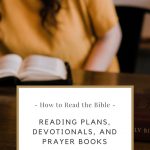Last week’s post focused on the two main ways that we read the Bible: for study and for devotion. We pointed out that both are important. Really, they’re both related to each other too. Now that we’ve looked at Bible reading form a 10,000 foot view, let’s focus in a bit.
If I want to read my Bible on a regular basis (or everyday if I’m really ambitious), where should I start? How do I decide how much to read? The truth is, you have complete control of where in the Bible you read and how much you read each day. Let’s be real though, that can be completely overwhelming. The Bible is a big book.
There might be some people out there that sit down with their Bible everyday, randomly read a passage that just came to them, and get something out of it. That’s not me. I need a plan or a guide. That’s why in this post, we’re going to talk a little bit about some different types of resources to help you plan out and guide your Bible reading. I’ve personally used each and every one of these resources at some point. They’re probably the main three things people use to guide their Bible reading.
Bible Reading Plans
The most basic tool out there for helping you decide what to read in the Bible is a reading plan. There are many, MANY different types of reading plans out there. If you do a quick Google search of “Bible Reading Plans”, you’ll be blown away by the number of results.
What Is It?
So what is a reading plan? Plain and simple, it’s just a list (usually organized by date or number of days) that gives you a consistently sized chunk of Scripture to read for each day. Some of these plans are designed to be read in a certain length of time (i.e. 15 minutes worth of reading each day). Other plans help you make it all the way through the Bible in a certain length of time (i.e. read through the Bible in a year).
Some plans just guide you straight through the Bible from Genesis to Revelation. Others try to have you read through the Scriptures chronologically of when the books were written or when the events in the Bible took place. Some plans you read sections of multiple books each day. You might read a little bit from the Old Testament, some from the New, and maybe a Psalm or a section of Proverbs. There are tons of options out there for you to choose from.
Where to Find One
You can find reading plans easily online. Biblegateway.com is a great free resource that has tons of different reading plans available. They’ll even email you the section of Scripture you’re supposed to read each day to make it easy. There are also apps that will give you a certain amount to reach each day, like the Youversion app.
If you prefer an actual book, you can buy a Bible organized by date and that has readings for each day. My husband and I bought one in January and are doing that together this year. This is a link to the one we bought. We’ve really enjoyed using it.
Pros
Bible reading plans are great because they can help keep you on track and you don’t have to come up with what you want to read each day. You don’t decide what you’re going to read that day, it’s already decided and planned out for you. You’re also reading directly from God’s Word on your own, which is great.
Cons
The downside to them is that unless you’re adding a study and/or devotional element to your reading (which you could always do), you don’t really have anything guiding your thoughts about a passage. Many times, it’s easy to just read, check off that you read, and not think much more about what you read.
To help combat this, you can try out are Bible study books (which I mentioned in last week’s blog post). These are usually guides that give you a section of Scripture to read each day, and then some prompting questions. They may also provide you with background material to help you better understand the text. There are many Bible study books out there. Many of them are made for small group use, but you can often use them individually as well.
Devotional Books
If you’re looking for something to give you a bit more guidance, devotional books or devotional guides can be really helpful.
What Is It?
Devotional books usually contain a Scripture passage to read each day, and then someone’s thoughts about that passage. Some devotional books might also have journal prompts or questions for you to think about.
Like with reading plans, there are a lot of different types of devotional books. Some focus on a particular book of the Bible. Others are on a particular topic. There are also many books out there that are designed to be used during a particular season (like Christmas or Lent).
Where to Find One
There are tons of great devotionals out there and some are even available online for free. Biblegateway.com and Youversion (mentioned above) both have devotions available as well as reading plans. Another great resource is Shereadstruth.com and Hereadstruth.com. These are sibling sites that provide free online devotionals for women and men respectively (they also have resources for kids too).
If:Gathering is another organization that provides free devotionals. These are geared toward women and often include a short video teaching as well as suggested Scriptures and something to read to guide your thoughts. Their devotionals are available for free online, in their app, or you can buy physical copies on their website.
If you like real books, there are tons of great devotionals you can check out. My Upmost for His Highest is a classic Christian devotional book that has been beloved for almost 100 years. Through the Bible Through the Year by John Stott is another devotional book that I’ve enjoyed. It follows the traditional liturgical church calendar and can help you stay in sync with the seasons of the church. Currently, I’m reading through the devotional 100 Days to Brave by Annie F. Downs. I’m really enjoying it thus far.
If you’re looking for something for a shorter period of time and you want to help support an up and coming blogger, you can also check out the devotional I wrote, 30 Days of Grace. It’s available as a downloadable file (which you can print out or read on your phone) or you can also get it in the Kindle store.
Pros
Devotional books are great because, like reading plans, they’re easy. You open the book, you read the assigned text. They also keep you form just reading a passage of Scripture and not really thinking about it to much. Devotional books can help guide your thinking and help you see things you might have otherwise missed.
Cons
Because many devotional books are topical, sometimes they skip around the Bible quite a bit. This means you don’t get a good feel of the overall message and context of the Bible. Many devotional books also really hone in on a very short piece of Scripture. Additionally, all devotional books are written by people, which means that not everything written in them could be theologically sound. Not that devotional book writers are out to get you, they just are not as infallible as God is.
Devotionals are a great help, but they should never replace you actually getting in there and reading God’s Word for yourself. If a devotional book helps you to do that, great. Just make sure you’re not using devotionals as a crutch. You should be doing a devotional book AND also reading your Bible on your own at times. There may be seasons where you’re only doing one or the other, but you should make sure both are a part of your relationship with God.
Prayer Books
The last type of resource I recommend that can help guide your Bible reading is a prayer book.
What Is It?
Prayer books are kind of a hybrid of a reading plan and a devotional. These books are traditionally used by liturgical churches, but you can also use them on their own. A prayer book has a Bible reading plan in it, but also contains prayers and psalms to help guide your thoughts back to God. These books include Scripture sections for you to read, prayers to guide your time with God. They might also include suggested worship songs to sing or a short devotional thought or a quote from someone in the church, either a modern thinker or an ancient one.
Where to Find One
The best known prayer book is probably the Book of Common Prayer. You can find this resource online for free. I will note that it’s not the prettiest website, but hey, free is hard to complain about. You can also purchase a physical copy of the book at almost any bookstore. Often, you can find a copy for pretty cheap in a used bookstore.
More recently, a few modern writers have written Common Prayer: A Liturgy for Ordinary Radicals. It’s a more modern, Protestant/nondenominational version of the traditional prayer book. Up until this year, that’s what my husband and I used in our morning devotions since we got married almost three years ago (we were wanting to branch out this year).
Pros
One nice thing about prayer books is that they were originally meant to be used in a communal setting like a church service or other spiritual gathering. This means that prayer books can be great to use for family devotions or for reading the Bible with a small group. They include the schedule of a reading plan, but also have just enough supporting material (prayers and other features mentioned above) to get you to think more deeply about how the Scripture applies to your life.
Cons
The downside of prayer books is that the prayer part can feel a bit forced or unnatural for some people. Depending on which one you’re using, they can also start to feel a bit repetitive. Regardless, they’re worth checking out if you haven’t used them before.
Find What Works for You!
Honestly, all three of things I’ve mentioned are great resources, though they might not work for everyone in every season. Try each one out for a bit and see what works best for you. Even if you’ve been using one of these tools for awhile, try out a new one. Our relationship with God is just like any other relationship. Sometimes trying something new can bring your relationship to a new level. Don’t be afraid to try different things out and experiment to find out what brings you closest to God and what you learn the most from.
Once again, if you have any questions about any of these resources or about Bible reading in general, please make sure to comment below. I’d also love to hear what you’re currently reading/using for your Bible reading. I’m always on the lookout for new tools and I would love to hear if there’s anything you’ve particularly enjoyed or found helpful.
Photo by Priscilla Du Preez on Unsplash

